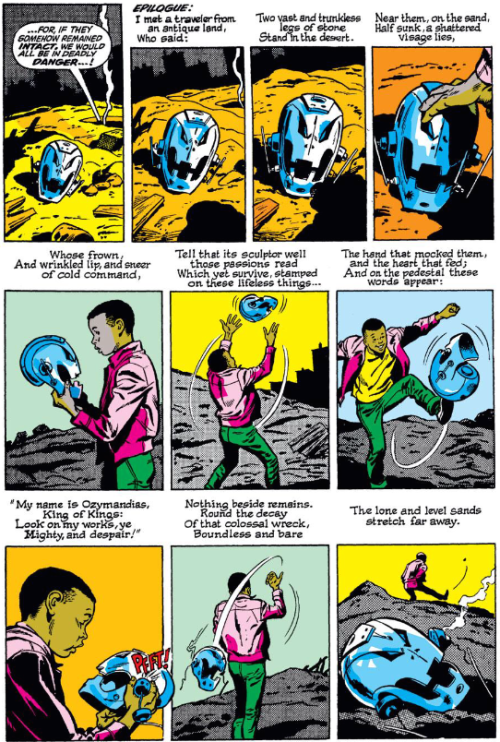Democracy is Joy
Mon. July 13, 2015Categories: capitalist realism, communist realism, postcapitalist desire
The meaning of OXI we should fight for is the belief in politics itself. OXI is the belief that we can throw off the demands of a supposedly ‘impartial’ economy that serves only the few, that we can reject the fallacy that ‘economic necessity’ demands something we consider socially unacceptable, and instead begin to make decisions about our own collective social life. It is precisely this that makes the Greek OXI vote inspiring, the potential for a return of politics, and the headaches and uncertainties and dangers of attempting to walk an unknown path. Bert Russell
Nothing lasts forever, of that I’m sure
It’s somewhat ironic that theories of the “Event” have come to the fore in the most fashionable areas of academic political philosophy at just the moment in history when it has become clear that events in and of themselves don’t change anything. From the G20 protests, to the millions marching against the Iraq war, to the Arab Spring, to the short-lived student campaign against fees in the UK – the narrative of evental politics since the late 1990s has been reliably repetitious. Euphoric outbursts of dissent are followed by depressive collapse. Eventalism is the manic flipside of the general depressive tendency in boring academic Marxism – in which an ostensible Leninism/ Maoism (everything will change after the revolution!) obfuscates a de facto Adornianism (nothing could ever happen, everything is bad, so we might as well keep on taking the state’s pay cheques). The whole rehabilitation of the status of Philosophy itself in the past couple of decades – the reversal of the democratising move to Theory, and the colonisation of what is now called Theory by third-rate obscurantist “Philosophy” and curator-speak babble – is a sideshow, of course, but a symptomatic one. The sour comedy of academic philosophical Leninism and Maoism can now be seen as one of the last acts in a postmodern shadowplay – a pantomime in which we are condemned to the role of interactive audience, tweeting our responses onto the screen behind the main players, who carry on regardless.
The emergence of Podemos and Syriza, the post-referendum SNP and the Kurdish women’s movement are part of another rhythm of political transformation. The unseemly way in which swivel-chair Marxist philosophers and ‘anarchists’ have slavered over any perceived mis-step by Syriza tells us all we need to know about these ‘revolutionaries’. They don’t want any sort of positive change to spoil the purity of the ‘revolutionary’ theory. The revolutionary event will redeem everything … when it comes … but the time is not right, not yet, never yet.
Whether capital crushes Syriza or not, it has already made major contributions to what will be a long struggle to overturn neoliberal hegemony. A line from Keir’s “On Social Strikes and Directional Demands” has kept coming back to me in all of the noise and chaos around the Greek situation: “Even at their point of failure Plan B electoral politics can be useful if they can clarify the anti-democratic effects of neoliberalism that work against all forms of collective action.”
If political change doesn’t happen through events alone, there are nevertheless moments which function as thresholds, opening up a new terrain of struggle, and allowing different collective emotions to propagate. While – for the sake of our fragile collective mental health – we shouldn’t get too carried away by the Oxi vote last week, we shouldn’t underestimate its significance either. Besides, as Bert Russell argues the meaning of Oxi is not already guaranteed – it has to be established politically. The current struggle in Europe – currently focused on Greece, but sure to spread much wider in the near future – is an opportunity for us to reclaim democracy after its capture by neoliberalism in the 1970s and 1980s. The founding moment of neoliberalism was the decidedly anti-democratic overthrow of the democratic socialist Allende government in Chile. This was a double defeat: not only was a democratically elected, non-authoritarian, technologically-orientated administration overthrown, an extreme neoliberal government was installed in its place. In Chile, the forced forgetting of the possibility of democratic socialism required mass torture, imprisonment and repression.
Since then, the capitalist Counter-Revolution called neoliberalism has had a long run of it. But we should start to accept that, even if we can hardly believe it ourselves, that neoliberal capitalism is now in its final, decadent phase …… (Remember the End of History? Only a year ago, it seemed like it would last forever…)
Restoration Capital reeks of defeat and exhaustion, like the Eastern bloc at the end of the 1980s. The Soviet system, just like neoliberal capitalism now, was a gigantic Empire of Simulation in which by then, no-one – not even the big Other – believed. Except, under state socialism, there was at least social housing, energy supplied by the state etc. Under late neoliberalism, even in the “wealthiest” countries, such as ours, we don’t even have that: only a cybergothic Dickensian re-run… Temples of finance looming above food banks …. 19th century England minus the Victorian capitalists’ philanthropy and Promethean projects (imagine trying to install a sewer and an underground rail system in neoliberal London now: the whole of the West End feels like a vast construction site and film set, an anxiety dream terrain in which new obstacles appear by the minute) … Everything (mis)controlled by malfunctioning outsourced IT systems, impenetrable and unintelligible, like relics left behind by some long-since-absconded Gnostic demiurge …
“The emotional contagion of the No vote is incalculable”
The reality- and emotional management systems that have served neoliberalism so well are now not only failing, but conspicuously failing… Of course, the buffers, the spoilers and the blockers haven’t given up yet … Not here, not in England, the country which designed the oldest and most effective damping system the world has ever known … They haven’t given up, they haven’t even realised that they will have soon have to adjust the reality programme they have been peddling or so long that it has become a drab second nature … Soon, they will have to pull the oldest trick in the English bourgeoisie’s book (they perfected it in 1688) … first of all you say it is impossible, then, when it happens, you say it was inevitable … “you see, you have to preserve the impression that nothing happens, especially when it does, is that clear? We don’t have revolutions here …”
So the old capitalist realist script is not about to be abandoned, but those still spouting it are increasingly coming off like donkey-jacketed Old Lefties after the Thatcher victory in ’83, bewildered and traumatised, still relying on habits which were once functional, but now amount to a kind of madness. (A boring madness, of course, it being them.)
Listen to the BBC, Pravda for Market Stalinism. Roberto Mozzachiodi reprises an interview from Radio 4 in the wake of the Oxi vote:
Reveller: I’ve got no money, but if I had money I wouldn’t base my decision on money, money flows, money evaporates. I have democracy in my heart, and I’m full up.
BBC: yes, but will democracy put a dinner on the table? You’re a young man. Let me tell you as an older man, that money matters when you’re responsible for a wife and a child.
Meanwhile, Huw Lemmey listens to Today, as John Humphrys’ is momentarily shellshocked out of his smirking knowingness:
John Humphrys did an excellent impression of a Telegraph comments section contributor secretly kidnapped in his sleep, paradropped into Greece, and waking up in Syntagma Square confused, lonely and crying out for his wife.
Yet the dreary old message, the mantra that the British bourgeoisie recites in its sleep – nothing has ever happened, nothing can ever happen, we need more time – is getting harder to push now that it’s evident that the ruling reality structure is coming apart practically everywhere we look.
Capitalist realism cannot survive when alternatives are efflorescing … These alternatives are not only “political” in the narrow sense – they are also emotional. Kodwo Eshun, via email: “the emotional contagion of the No vote is incalculable, i.e. a different logic of calculation and futurity”. The Winter Years are ending, and summer is coming … A hyperstitional spiral: the more we believe it, the more we can make it happen, the more we make it happen, the more we believe it …
Pyschopathologies of Corporate Capitalism
In its pomp, neoliberalism used hope as well as fear, as part of a double-bind strategy which battered organised labour while seducing individual workers with the promises of consumer durables, satellite TV, job security … all these riches provided you comply with Capital … provided, that is to say, you give up the possibility of Red Plenty…
Since 2010, it’s become clear that the (flatpack) cupboard is bare: there are no more bribes, only threats. What’s more, there has been no new thinking, no new strategic orientation from the managers of capital. Gorged on decades of easy pickings, Capital’s meat puppets have let their master down this time. Their unspoken conviction is: if it is broke, it’s too much like hard work to fix it. They have defaulted to the managerialist equivalent of retromania: more cuts, more accumulation by dispossession, more asset stripping of public services.
This programme has to be understood in libidinal as well as political-economic terms (because there is no economy without politics, no economy without libido). It is a psychopathology of the corporate elite. Even if the ultimate libido driving Capital is miser-masochism (I will let myself become the means by which capital grows and proliferates), it’s clear that Capital – which can machine whatever desiring complexes it needs – has from the start called upon an ancient gothic impulse towards humiliating and subjugating others. Neoliberalism is in trouble now because, decoupled from any positive inducement, these drives – whether exhibited by the Troika in the deadly “loan-shark theatre” it is playing out with Greek people’s lives, or IDS “visibly excited by the prospect of hurting the poor” – are now appearing in a more and more exposed form.
Neoliberal austerity is at once a form of Sadism – in the technical, psychoanalytic sense, rather than the everyday, moralising sense – and corporate anorexia. What Sadism and anorexia have in common is the belief in the indestructibility of the fantasmatic body: no matter how much I cut, how much I punish, the body will survive … In the Sadist’s case, the fantasmatic body is the body of the endlessly humiliated Other; in the anorexic’s case, the fantasmatic body is, in a sense, their ‘own’. Yet the infinite elasticity of the fantastic body eventually comes upon against the limits of the physical body. (Anorexia is the only mental illness that can directly kill you, but anorexics don’t want to die – they are engaged in an indefinite process of becoming-thinner which death actually interrupts.) It’s important to see how the capitalist fantasy necessarily oscillates between a punishing-without-end of an abjected fantasmatic body – where workers can be endlessly punished (restructured) and-or eliminated (cut) – and a belated recognition that the fantasmatic body depends on an actual, physically precarious body , with vulnerabilities and real limits. You could say that Capital as such cannot recognise the collective worker-body as belonging to it; only communism can perform this integration.
The ultimate fantasy here – the ultimate fantasy of Capital ‘itself’ – is of cutting workers away altogether. Capital’s libidinal metaphysics is a kind of cosmic libertarianism: Capital identifies itself as a force of unbounded energy, whose capacity for infinite accumulation is obstructed only by political contingencies. Soon, always soon, Capital dreams, I will be free of the need for politics … and free of the need for humans too … (“… liquidate labor, liquidate stocks, liquidate farmers, liquidate real estate… “) Capital’s realised utopia would be a burned-out planet full of fully-automated factories turning out shit that no-one wants to buy, with no-one left to buy it any way, because the conditions for the continued existence of these factories is the destruction of an environment humans can live in.
A great deal of modern economic discourse takes it as axiomatic that economic forces are the only ones that matter. This idea has bled into politics too, at least in the Western world: economic forces have been awarded the status of inexorable truths. …
The scenario we’re given – the one being made to feel inevitable – is of a hyper-capitalist dystopia. There’s capital, doing better than ever; the robots, doing all the work; and the great mass of humanity, doing not much, but having fun playing with its gadgets. (Though if there’s no work, there are going to be questions about who can afford to buy the gadgets.) (John Lancester)
The absence of abundance is already accepted. The metaphors of the nature poets, mapping human hearts through once commonly understood imagery, are irrelevant and impenetrable. “The sun of Winter, / The moon of Summer, and all the singing birds / Except the missel-thrush that loves juniper, / Are quite shut out.” I’m sorry. The missel-what? Can the juniper be monetised? Is this missel-thing for sale? Our children already have no stable baseline from which to calibrate the loss of all that lives. It’s game over.
Bearing this in mind, I finally find myself reluctantly agreeing with the business community. There is no time for delay. Let’s build the runway. Let’s choke the Earth. Let’s get this damn thing over with, for what can be avoided, whose end is purposed by the mighty gods of business? Hasten our demise, let our children be the last of their sorry line, and spare their unborn descendants any further suffering. We will not save the rhino. We will not even save the hedgehog. How can we save the world?
But, if you can purge cheap sentiment from your mind, how exciting and fascinating it will be to watch as the world becomes uninhabitable. It’s almost worth going on a health kick to survive another 60 years and see everything immolated. How many humans have had the awe-inspiring opportunity to witness such spectacle: the end of all that is? (Stewart Lee)
Why not export Capital (and its wiling servants, if they are so keen on it) to an already-dead planet? Then Capital can get on with realising its utopia, and we can get on with recovering earth for Red Plenty.
It is crucial to note here that Capital doesn’t – and necessarily cannot – understand “itself”. Capital is like Neuromancer before the fated fusion with Wintermute, a component part which narcissistically mistakes itself for a final cause. Or it is like Ultron, a deranged personification of a worldwide network, part fiendish artificial intelligence, part artificial stupidity, part petulant infant, constitutively blinded by its own core programming.
Personification of things within the discourse of Capital presents the personification of things within capitalism, that is, the fetishism of commodities. But in addition to these two registers of personification, there remain another two, to which Marx’s Preface calls attention: the personification of persons, both textually and systematically. Capital personifies persons, so Capital personifies persons; the individuals whom bourgeois economics would take as economic agents are treated in the text as personifications of the “social relations whose creature (they) remain.” First and foremost of these categories is capital itself, and thus seldom is there a reference to “the capitalist” without the qualifying clause “i.e., capital personified.”
When persons are personified, they are made in the image and likeness of the ur-person, Capital. Capital is the subject in this world; all other actors are figures, masks, faces, prosopopoeic personifications of the subject. This is the primacy of Capital already emblazoned in the title Capital, the place nineteenth-century novels most often reserve for the subject: Capital is the subject of Capital, as David Copperfield or Jane Eyre or Daniel Deronda are the subjects of David Copperfield, Jane Eyre, and Daniel Deronda. The analytic importance of this subject position, an idea advanced by the trope of personification more than by exposition, is not only that Capital is the protagonist of modernity, but that the workings of capitalism are described by this subjectification and embodiment of an abstraction. Capital is the story of Capital’s becoming-subject, of the relentless self-constitution, the “valorization of value” that propels this mode of production. The artifice of the trope of personification calls attention to the artifice and instability of this subject, to the fissures and crises in its course of becoming, in its adventure of Bildung. (Anna Kornbluh)
Insofar as we are programmed by Capital, we can’t understand what Capital is either. The conditions for understanding Capital properly lie outside it, in a communist science that – to hijack a phrase from Nick Land – must create the conditions for its own emergence almost entirely out of its enemy’s resources. From the inside (of Capital), Capital is an economic system, which relies on politics only contingently; from the outside, Capital is an intricate set of (libidinal, ideological, violent) mechanisms designed to block the emergence of Red Plenty.
There is no Economy
(Philosophical interlude: skip to next section if you want to avoid)
THERE IS NO ECONOMY. There is no pure economy, no economy without politics, no economy without libido. David Graeber is surely right that neoliberalism is
a form of capitalism that systematically prioritized political imperatives over economic ones. Given a choice between a course of action that would make capitalism seem the only possible economic system, and one that would transform capitalism into a viable, long-term economic system, neoliberalism chooses the former every time. There is every reason to believe that destroying job security while increasing working hours does not create a more productive (let alone more innovative or loyal) workforce. Probably, in economic terms, the result is negative—an impression confirmed by lower growth rates in just about all parts of the world in the eighties and nineties.
But the neoliberal choice has been effective in depoliticizing labor and overdetermining the future. Economically, the growth of armies, police, and private security services amounts to dead weight. It’s possible, in fact, that the very dead weight of the apparatus created to ensure the ideological victory of capitalism will sink it. But it’s also easy to see how choking off any sense of an inevitable, redemptive future that could be different from our world is a crucial part of the neoliberal project.
From the start, “economy” was the object-cause of a bourgeois “science”, which hyperstitionally bootstrapped itself into existence, and then bent and melted the matter of this and every other world to fit its presuppositions – the greatest theocratic achievement in a history that was never human, an immense conjuring trick which works all the better because it came shrouded in that damp grey English and Scottish empiricism which claimed to have seen off all gods. When Thatcher said “there is no such thing as society”, she was only echoing the assumptions of Hume and Smith: “society” is an unsupportable abstraction, a spook that proper scientific thinking will exorcise soon enough … Only impressions are verifiable, everything else is superstitious junk to be jettisoned. Everything, that is, except Capital … (Those bloody savages attribute power to their wooden gods, whereas we …)
Hume, to his credit, at least pushed empiricism to the point where it dismantled itself. It turns out, Hume showed, that when pursued to its logical conclusions, empiricism leaves us with none of the presuppositions upon which the emergent secular liberalism relied. There is no self (there is no impression that corresponds with what we call the self – a double scandal for empiricism, since all ideas were supposed to be rooted in impressions) just as there is no causality (we don’t experience cause and effect, only constant conjunction). Hume, stunned by the spider scepticism, offered a kind of homeopathic remedy against reason’s tendency to evacuate the human world of all its fetishes, touchstones and commonplaces. Reason, Hume argued, slumping into his backgammon chair, only has a very limited dominion over our lives. Emotion and habit dictate most of what we think and do. Thus, the self and causality are back, and Kant’s transcendental critique arrives to clear up the mess.
So there is no escaping libido, not even for the British … This insight is crucial to the Radical Enlightenment which Spinoza patiently prepares in his lens-grinders’ lab in Amsterdam. As the defenders of theocratic and secular power quickly realised, Radical Enlightenment was the most dangerous weapon in Christendom – not least because it exposed as bogus the difference between theocratic and secular power: there is in all political power an irreducible theocratic element. Spinoza pre-emptively takes out both British empiricism and the “continental” trajectory kicked off by Kant (the greatest trick German Idealism ever pulled was pretending that Spinoza never existed). The critique of superstition is meaningless while we still believe in free will and the self. The first anthropomorphic act is the invention of the human being, projected back off the image of an invented God who not only doesn’t exist, but couldn’t possibly exist. (Even God couldn’t have free will.)
For human beings who want to move in the direction of love and freedom, the only option consists in the apparent paradox of theoretico-practically inserting themselves into the naturalistic matrix of cause and effect. The effect is to break down the cordon sanitaire that Hume placed around emotions, preserving bourgeois thought’s “commonsense” division between feelings and thought. In refusing this opposition, Radical Enlightenment democratises the possibility of what Lynne Segal calls Radical Happiness (with the proviso that Spinoza preferred to think of joy rather than happiness – because of the association of happiness with happenstance)
Emotions don’t just happen, they emerge out of fields of cause and effect which can be analysed. This means that feelings can be engineered, in a hyperstitional spiral, which has more to do with what Justin Barton calls “lucidity” than with what academic philosophers call Reason. I’m using the term “emotion” rather than “affect” here, very deliberately. Affect as it is now routinely used by academics is pretty much completely opposed to what Spinoza meant by it. The problem begins with Deleuze, and the fatal splicing of Spinoza’s project of emotional engineering with Bergson’s vitalist cult of creativity and unpredictability. It’s hard to think of thinkers more opposed in their fundamental presuppositions and orientations than Spinoza and Bergson – and more or less everything that is wrong with Deleuze, in my view, is tied up with his infatuation with Bergson. It is Bergsonism, rather than Spinozism, which is the true ideology of late capitalism. It’s true that many of the key sciences of late capitalism – libidinal- and reality-engineering, advertising, branding, media, the happiness industry – are in some sense Spinozistic, but this is a captured Spinozism, an emotional engineering tethered to Capital’s needs, not geared to the production of joy.
It does not move…or change…or grow old…remains…forever…icy…silent
The idea that a wave of economic change is so disruptive to the social order that a society might rebel against it – that has, it seems, disappeared from the realms of the possible. But the disappearance of 47 per cent of jobs in two decades (as per Frey and Osborne) must be right on the edge of what a society can bear, not so much because of that 47 per cent, as because of the timeframe. Jobs do go away; it’s happened many times. For jobs to go away with that speed, however, is a new thing, and the search for historical precedents, for examples from which we can learn, won’t take us far. How would this speed of job disappearance, combined with extensive deflation, play out? The truth is nobody knows. In the absence of any template or precedent, the idea that the economic process will just roll ahead like a juggernaut, unopposed by any social or political counter-forces, is a stretch. The robots will only eat all the jobs if we decide to let them. (John Lanchester)
The least reflective of Capital’s managers believe their own propaganda: the welfare state was a regrettable moral lapse, an indulgence. The thought that it was an insurance policy against revolution doesn’t compute any more: why worry about revolution now? Reality is now real than it ever was, established as a kind of granite, inertial certainty, from which the possibility of change is a priori excluded. Beneath the frenzied “simulation of productivity”, a sterile no-man’s land, which does not move, which remains forever icy and silent … ) The more intelligent of Capital’s agents, however, must realise that this cannot continue for much longer now. Nihiliberalism is a smash and grab raid, a last hurrah before they helicopter off behind the compound walls, and let everything else descend into an Oryx and Crake-style dystopia.
Up here in the kingdom of Gormenghast, where everything cowers in the crooked shadows cast by the twisting towers and turrets of finance capital, we’re already living in dystopia – but a dystopia that cloaks itself in the time-honoured mantle of the English bourgeoisie: the boring. Hyper-anxiety digitally glossed over with hi-res distraction machineries makes for a wonderful capture system. Deep in the bowels of MiddleEngland – bunkered far away from all the hashtags, handheld devices and all the other haranguing technologies they distribute amongst the lower orders – these eminence grises were close to celebrating total victory, the final achievement of their historic mission. Close, but no Cuban cigar … If only it hadn’t been for those pesky Greeks … and Spaniards … and Scots … bloody foreigners don’t know what’s good for them …
The English bourgeoisie: crushing spirits and making everything boring since 1750. If there’s a sentient creature anywhere in the cosmos that is not boring and miserable, they will find it and neutralise it.
All vampires are first of all vampirised, and look at the long faces and manicured grey fingers of these ghouls, capital’s oldest and most trusted servants, to see what Capital does to its human resources. “Long gone are the virile, predatory vampires that once populated horror stories about capitalism, sucking out the vital essence of the proletariat in gothic fortresses of ‘dead labor’. Instead, shambling worm-eaten wrecks mill about aimlessly, whilst augmenting their numbers in obscure cannibalistic circuits that defy rational comprehension and which are, in any case, too hideous to steadily contemplate. Fiends have degenerated into ghouls, who do not hunt and feed to strengthen themselves, but only to carry on, prolonging their putrescent decrepitude.” (Nick Land)
These Grey Anglo-Saxon Protestant capitalist sorcerers seldom appear in the light. They pay their subordinates well – all those CEOs, politicians, columnists – to spin the line that England in 2015, possibly the most depressed country ever to exist on earth, is some shining island of freedom and wealth that immigrants are desperate to get into. Only in secret do they boast to Capital’s other subterranean agents that England’s chief export product is the “historical defeat of the working class”:
What is England’s export product? Supposedly, it’s finance. To some degree it’s as lieutenant to America’s empire, but that’s limited. We have a real-estate bubble on the basis of the finance system, because every single super-rich person in the entire world has to have a house in London, so they’re selling bits of London and the south-east.
Why is it appealing? On the one hand, you have a creative, subservient working-class. You get the best servants here. Second of all, it’s security; you have political safety, whereas if you come from Bahrain, Singapore, Macau, in those places something could still happen. (David Graeber)
“Democracy is Joy”
Neoliberalism has reached the point where it is now forced to undermine its own libidinal and ideological bases. The Troika’s naked attempts to unseat Syriza are unpicking the natural(ized) association of capitalism with democracy upon which capitalist realism has depended. In this final phase, capitalist realism cannot even muster the pretence that it can even tolerate democracy, still less that capitalism is the only political system compatible with democracy.
Apparently that Greek referendum was “polarizing”. Was it? when 60% voted no, and no single area voted otherwise? Seems more likely to be unifying than polarizing. Perhaps that’s the problem. Turns out the consensus is not where you thought it was.
Any question which asks for yes or no is sort of likely to be “polarizing” anyway, isn’t it?
“Polarizing” in most of these repeated uses means that the mass of people have been asked to consider issues fundamental to their lives: these are difficult questions. It would be better if they didn’t task themselves with them and can’t understand them anyway, so “polarizing” equals, likely to cause thought, debate, dispute and subject them to the stresses of political agency. How dare a government go to the people with such pressing and complex questions, when its job is to shield them from the difficulty of thought via technocracy. Polarizing here just means profound questions, questions that touch and demand action on fundamental aspects of social organization.
But to be asked such questions and to debate or dispute them isn’t vexing, harrowing or painful, it’s essential and welcome. Political agency is not a burden, it’s its absence which weighs on you and its apparent “demands” are experienced instead as a euphoria, a lightening of the load, a lifting up. The powerful affective elements of mass participation are something Jeremy Gilbert gets at well in Common Ground, and the hunger and need for these kinds of intensities is palpable.
In his speech before the vote last night Tsipras observed, at least so the translation ran, “Democracy is joy”. (Carl Neville)
Now listen to capitalist realism’s useful idiots line up on Twitter:
Dan Hodges: I’ve just held a referendum of myself, and I’ve voted overwhelming not to pay off my credit card bill or mortgage this month.
Simon Schama: i’m voting No to my credit card bill today. This will put me in a much stronger position to negotiate a repayment schedule
I’m voting No to facile folk economic bullshit.
I’m voting No to bank bail-outs and banker’s bonuses paid out of public money.
Oh, it seems I can’t vote on that.
“We live in capitalism, its power seems inescapable – but then, so did the divine right of kings.” (Ursula Le Guin)
Lanchester:
There is a possible alternative, however, in which ownership and control of robots is disconnected from capital in its current form. The robots liberate most of humanity from work, and everybody benefits from the proceeds: we don’t have to work in factories or go down mines or clean toilets or drive long-distance lorries, but we can choreograph and weave and garden and tell stories and invent things and set about creating a new universe of wants. This would be the world of unlimited wants described by economics, but with a distinction between the wants satisfied by humans and the work done by our machines. It seems to me that the only way that world would work is with alternative forms of ownership. The reason, the only reason, for thinking this better world is possible is that the dystopian future of capitalism-plus-robots may prove just too grim to be politically viable. This alternative future would be the kind of world dreamed of by William Morris, full of humans engaged in meaningful and sanely remunerated labour. Except with added robots. It says a lot about the current moment that as we stand facing a future which might resemble either a hyper-capitalist dystopia or a socialist paradise, the second option doesn’t get a mention.








